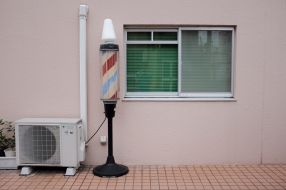HEPA Air Purifiers: How They Can Help Keep Spaces Safer

Making your space compliant with local health and safety measures has never been more important. More and more, companies and property owners are evaluating their HVAC systems to ensure they can help purify the air and keep people inside more protected against possible infections. But can HEPA air purifiers actually help contain the coronavirus?
To answer that question, we have to understand how the virus spreads and how HVAC systems can help. From there, we can then understand the effectiveness of HEPA air purifiers and how they can be an important part of a broader coronavirus contingency plan.
How COVID-19 Spreads
You may remember that in the early days of the pandemic, scientists were still learning the specifics of how the coronavirus, known as “COVID-19”, spread. As we have learned more, the general consensus is that the virus spreads through respiratory droplets and droplet nuclei (dried respiratory droplets) breathed out by people infected with the virus. After these droplets enter the air, they can land in people’s eyes, nose and throat, where it can then spread into the body and start replicating.
With the new Delta variant, which accounts for most of the coronavirus infections in the United States, and has a significantly higher “viral load,” it means the amount of virus trapped in these droplets can be higher than with the COVID-19 virus of the early pandemic.
For people with pets, you should know that there have been very rare instances of the virus spreading to cats and dogs. It is recommended that anyone infected with COVID-19 should be isolated from people and their pets for everyone’s safety.
Do HEPA Air Purifiers Protect from the Coronavirus?
In a word, yes. But it is important to understand how they operate so you can take additional measures to protect people. Many governments and local authorities recommend HEPA air purifiers as part of an overall coronavirus strategy. They should be used in conjunction with other measures.
High Efficiency Particulate Air (HEPA) filters are filters that can “theoretically remove at least 99.97% of dust, pollen, mold, bacteria, and any airborne particles with a size of 0.3 microns (µm),” according to the United States Environmental Protection Agency (EPA).
The unit “0.3 µm” is important to remember, because the average size of a coronavirus particulate is roughly 0.1 µm on its own. However, since we know that COVID-19 spreads through droplets, the real number that we need to know is the size of those droplets, which is roughly 0.5 µm. Therefore, HEPA filters can collect and filter out droplets that could potentially contain the coronavirus.
How to Expand Protection with HEPA Filters
HEPA filters are an effective means to removing the coronavirus from the air but it’s important to note that they are best used in conjunction with other strategies. Broadly, any coronavirus plan needs to consider hardware and protocols. Let’s go through each.
Hardware, for the most part, includes things like HVAC system upgrades and expectations around personal protective equipment being used inside a building. HVAC and ventilation has been getting a large amount of coverage as schools head back into session. Schools and many other buildings do not have the necessary ventilation in place to filter air through and keep people safe. HEPA air purifiers in conjunction with recommended HVAC upgrades can help improve overall air quality and work to limit the spread of the virus indoors.
That said, ventilation improvements and HEPA air purifiers alone are not enough. Proper social distancing and compliance with local mandates about PPE and building occupancy can also help stop the spread and keep building occupants safe.
When it comes to stopping the spread of the coronavirus, HEPA air purifiers can play an important part in an overall strategy. Since these filters are designed to stop particles smaller than the droplets that spread the virus, they can effectively filter out the virus when used correctly. On top of this, HVAC improvements that include increasing ventilation can help as well when used together with protocols like social distancing and masking as required or mandated.
If you own a property with regular in-person visitors, be sure to use HEPA air purifiers and connect with HVAC professionals to ensure your systems are working hard to limit the spread of the virus.

